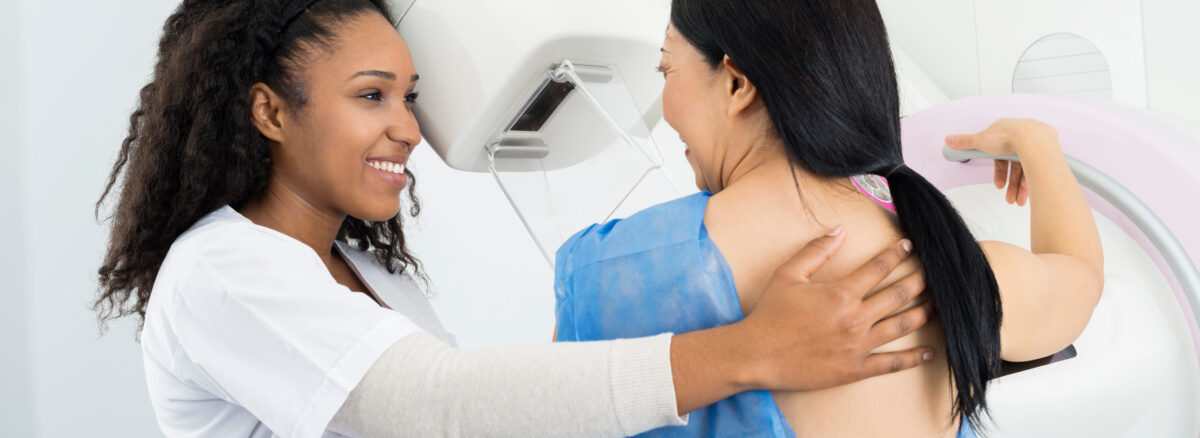Breast cancer is a serious condition that affects both men and women, and early detection is crucial for successful treatment. At Woodridge Clinic, with locations in Woodridge, Lombard, and Lemont, IL, we offer a range of advanced diagnostic tools to help detect breast cancer as early as possible. We proudly serve surrounding areas, including Addison, Darien, Bolingbrook, Homerglen, Joliet, Naperville, Villa Park, and Westmont. Here’s an overview of how breast cancer is typically diagnosed.
Mammogram
A mammogram is the most common tool used to detect breast cancer. This imaging test uses low-dose X-rays to examine breast tissue for abnormalities, such as:
- Asymmetries in tissue
- Calcium deposits (calcifications)
- Distortions in tissue structure
- Solid masses or cysts
During the procedure, each breast is compressed between two plates to spread out the tissue and allow for a clearer image. While it can be uncomfortable, the compression is brief and helps healthcare providers detect potential cancer early. Routine screening mammograms are recommended even if you have no symptoms, starting at age 40 for most people, according to the U.S. Preventative Services Task Force (USPSTF).
If any suspicious areas are found during a screening, a diagnostic mammogram may be ordered. This follow-up test captures more detailed images and is typically used when symptoms like lumps, pain, or nipple discharge are present.
Ultrasound
An ultrasound uses sound waves to create images of the inside of the breast. It is often used as a follow-up to a mammogram to examine areas that may not be clear on an X-ray. This test is particularly useful for people with dense breast tissue, as it can provide more detail than a mammogram. The procedure is painless and involves moving a wand, called a transducer, over the skin after applying a special gel to the area.
MRI
Magnetic resonance imaging (MRI) provides highly detailed images of breast tissue using radio waves and magnets. An MRI is often used if a mammogram or ultrasound detects something suspicious. It can also help determine the size and location of breast cancer if already diagnosed. A contrast dye is typically injected to enhance the images. While the procedure is painless, some patients may feel uncomfortable in the enclosed MRI machine.
Biopsy
If imaging tests suggest cancer may be present, a biopsy is the next step. A biopsy involves removing a small sample of breast tissue to be analyzed under a microscope. There are different types of biopsies, and the best approach will depend on factors such as the size and location of the suspected tumor.
It’s important to remember that a biopsy does not automatically mean you have cancer. Many biopsies come back benign (non-cancerous).
Staging of Breast Cancer
If a biopsy confirms the presence of breast cancer, the next step is to determine the stage of the disease. Staging helps guide treatment decisions and assess how far the cancer has spread:
- Stage 0: Known as ductal carcinoma in situ (DCIS), this is a pre-cancerous stage where abnormal cells are confined to the breast ducts.
- Stage 1: A small tumor is present but has not spread beyond the breast.
- Stage 2: Either a small tumor has spread to nearby lymph nodes, or a larger tumor is still confined to the breast.
- Stage 3: Larger tumors have spread to lymph nodes or nearby tissues.
- Stage 4: The cancer has spread to other parts of the body, such as the bones, lungs, or liver. This stage is not curable, but treatments can help extend life expectancy.
What You Should Know
Early detection is vital in treating breast cancer successfully. By using advanced diagnostic tools like mammograms, ultrasounds, MRIs, and biopsies, Woodridge Clinic provides comprehensive care to help diagnose and treat breast cancer at the earliest possible stage. If you notice any changes in your breasts, such as a lump or persistent pain, or if it’s time for your regular screening, make an appointment with us today.
Take charge of your health by scheduling your breast cancer screening at Woodridge Clinic. We’re here to support you every step of the way.
Call us at 630-910-1177, book your appointment online today!

